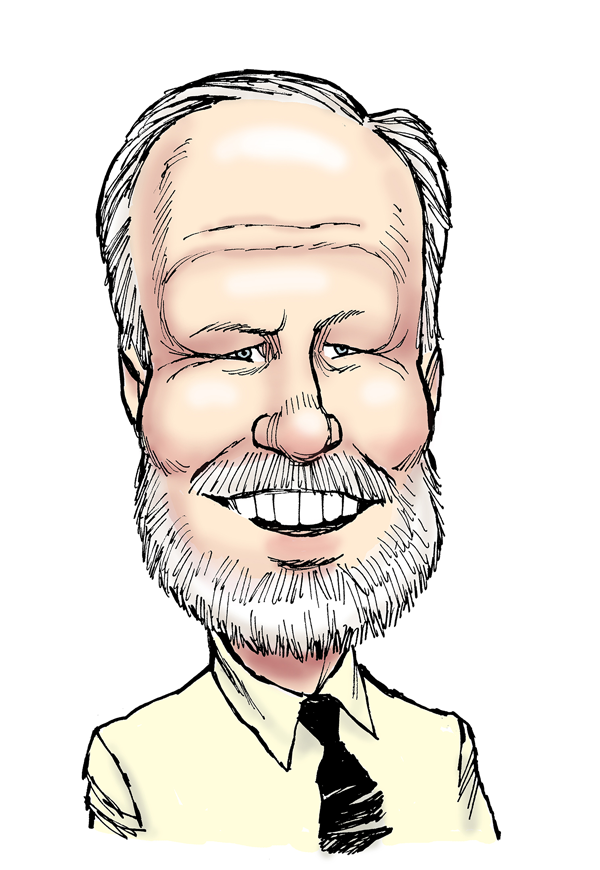Vice presidential candidates Tim Kaine and Mike Pence went head-to-head for the first time at Longwood University in Farmville, Va. To help us through the debate, we enlisted the help of three of our political writers and columnists to act as judges. Each judge scored every round with a win, lose or draw and declared Pence the winner at the end. Head to Trail Guide for more updates and check out the most important exchanges from the debate through the transcript.
Debate scorecard
We're dividing the 90-minute debate into three 30-minute rounds. Check the scoreboard during the debate to see what our judges thought of the candidates' performances.
Key: Pence wins the round Kaine wins the round Tie
Key: Pence wins the round Kaine wins the round Tie
Winner: PENCE

Mark Z. Barabak
Political reporter

Cathleen Decker
Political analyst and columnist

Doyle McManus
Political columnist
Round 1
Round 2
Round 3
Overall winner
Round 1

Mark Z. Barabak

Cathleen Decker

Doyle McManus
What the judges thought:
- The vice presidential candidates were supposed to be the nice guys on the tickets, but they’ve already proven that they can be as ticky-tacky, interrupting and annoying as most other candidates on any debate stage. Kaine seemed too hyper, at least in this early stage, persistently interrupting in a way that didn’t necessarily benefit his ticket. Pence showed Donald Trump what he was supposed to do in his own debate last week – offer concise points about the GOP’s plans and lance both Hillary Clinton and Tim Kaine repeatedly with his sad-eyed, aw-shucks mien.
- Mike Pence is delivering the debate performance Donald Trump needed a week ago: Focusing on whether voters want change or more of the same. Tim Kaine came out as a prototypical attack dog, a role that doesn’t suit him especially well. Paradoxically, though, it was Pence who got under Kaine’s skin, baiting him to defend the Obama economic record. (Or, as Pence would put it, the Obama-Clinton economic record.) “Fifteen million new jobs,” Kaine said. “People in Scranton” – in the swing state of Pennsylvania – “know different,” Pence said. Round goes to Pence.


Mark Z. Barabak

Cathleen Decker

Doyle McManus
What the judges thought:
- The vice presidential candidates were supposed to be the nice guys on the tickets, but they’ve already proven that they can be as ticky-tacky, interrupting and annoying as most other candidates on any debate stage. Kaine seemed too hyper, at least in this early stage, persistently interrupting in a way that didn’t necessarily benefit his ticket. Pence showed Donald Trump what he was supposed to do in his own debate last week – offer concise points about the GOP’s plans and lance both Hillary Clinton and Tim Kaine repeatedly with his sad-eyed, aw-shucks mien.
- Mike Pence is delivering the debate performance Donald Trump needed a week ago: Focusing on whether voters want change or more of the same. Tim Kaine came out as a prototypical attack dog, a role that doesn’t suit him especially well. Paradoxically, though, it was Pence who got under Kaine’s skin, baiting him to defend the Obama economic record. (Or, as Pence would put it, the Obama-Clinton economic record.) “Fifteen million new jobs,” Kaine said. “People in Scranton” – in the swing state of Pennsylvania – “know different,” Pence said. Round goes to Pence.
Round 2

Mark Z. Barabak

Cathleen Decker

Doyle McManus
What the judges thought:
- If Tim Kaine’s interruptions were the most annoying of the first round, Mike Pence’s were the most annoying of the second. Kaine did better in this round with concise indictments of Donald Trump’s insults and of his immigration plan. Pence parried well and has mastered the art of denying Kaine’s accurate statements about Trump’s positions. Oh, and this segment ends with Pence's patented description of Trump as “broad-shouldered” -- a gender reference he has used throughout the campaign. He also pushed the boundaries of logic by reacting with surprise to the notion that Trump’s campaign could be described as “insult-driven.”
- Both candidates embraced the traditional attack-dog role. Kaine in short: “Donald Trump, Donald Trump, Donald Trump.” Pence in short: “Hillary Clinton, Hillary Clinton, Hillary Clinton.” Pence accused Kaine and Clinton of disrespecting all law enforcement officers. Kaine accused Trump – accurately – of insulting Mexicans and women, and expressed faux shock that Pence was attempting to defend his running mate. Partisan talking points on both sides; neither candidate’s finest half-hour.


Mark Z. Barabak

Cathleen Decker

Doyle McManus
What the judges thought:
- If Tim Kaine’s interruptions were the most annoying of the first round, Mike Pence’s were the most annoying of the second. Kaine did better in this round with concise indictments of Donald Trump’s insults and of his immigration plan. Pence parried well and has mastered the art of denying Kaine’s accurate statements about Trump’s positions. Oh, and this segment ends with Pence's patented description of Trump as “broad-shouldered” -- a gender reference he has used throughout the campaign. He also pushed the boundaries of logic by reacting with surprise to the notion that Trump’s campaign could be described as “insult-driven.”
- Both candidates embraced the traditional attack-dog role. Kaine in short: “Donald Trump, Donald Trump, Donald Trump.” Pence in short: “Hillary Clinton, Hillary Clinton, Hillary Clinton.” Pence accused Kaine and Clinton of disrespecting all law enforcement officers. Kaine accused Trump – accurately – of insulting Mexicans and women, and expressed faux shock that Pence was attempting to defend his running mate. Partisan talking points on both sides; neither candidate’s finest half-hour.
Round 3

Mark Z. Barabak

Cathleen Decker

Doyle McManus
What the judges thought:
- The most illuminating section of the entire debate came near the end, when the candidates were asked to discuss a time when their faith had conflicted with their responsibilities. Out from a morass of bickering came two thoughtful answers, which drove the men in different directions, but at the very least told America something about each of them. It’s a shame the rest of the debate descended into a haze of interruptions.
- On Syria and Russia, Pence wandered way off the Trump reservation, calling for a U.S.-guaranteed safe zone in Syria (and possible U.S. airstrikes against the Syrian army) and denouncing Vladimir Putin as a threat to the West. Those positions both break with Trump's — but they’re squarely in the GOP mainstream, leading plenty of pundits to wonder whether Pence is running for the 2020 nomination already. Kaine continued trying to hang all of Trump’s intemperate comments around Pence’s neck; Pence continued to pretend Trump never said them. In an interesting close, both candidates talked of religious faith — with Kaine reminding viewers (if any were left) that Pence has long called for overturning Roe vs. Wade. On style, the round went to Pence; on substance, to Kaine.


Mark Z. Barabak

Cathleen Decker

Doyle McManus
What the judges thought:
- The most illuminating section of the entire debate came near the end, when the candidates were asked to discuss a time when their faith had conflicted with their responsibilities. Out from a morass of bickering came two thoughtful answers, which drove the men in different directions, but at the very least told America something about each of them. It’s a shame the rest of the debate descended into a haze of interruptions.
- On Syria and Russia, Pence wandered way off the Trump reservation, calling for a U.S.-guaranteed safe zone in Syria (and possible U.S. airstrikes against the Syrian army) and denouncing Vladimir Putin as a threat to the West. Those positions both break with Trump's — but they’re squarely in the GOP mainstream, leading plenty of pundits to wonder whether Pence is running for the 2020 nomination already. Kaine continued trying to hang all of Trump’s intemperate comments around Pence’s neck; Pence continued to pretend Trump never said them. In an interesting close, both candidates talked of religious faith — with Kaine reminding viewers (if any were left) that Pence has long called for overturning Roe vs. Wade. On style, the round went to Pence; on substance, to Kaine.
Final thoughts

Mark Z. Barabak

Cathleen Decker

Doyle McManus
What the judges thought:
- What viewers got out of this debate depends largely on their point of view. Those seeking to understand what kind of president Democrats think Trump would be got an earful from Tim Kaine; those seeking to know what Republicans fear about Hillary Clinton heard that from Mike Pence. Stylistically, Pence was a better debater: He came across as cool and measured. If you’re a stickler for truth, however, you might have objected to the fact that he repeatedly denied things that Trump has said or done, as though by force of personality he could erase Trump’s insults. (He denied, for example, that Trump had said women who have abortions should be punished. Trump did say that, in an interview with MSNBC’s Chris Matthews.) Kaine had some strong points as well, repeatedly asking why Pence wasn’t defending Donald Trump. (And he wasn’t.) In the end, a narrow Pence victory, but one that will not matter in the grand scheme of a race in which they have been overshadowed. After tonight, they’re about to be overshadowed again, beginning with Sunday’s second presidential debate.
- Pence won this debate narrowly — but on style more than substance. He summoned his easy, avuncular manner as a former radio host to deliver tough lines with an aw-shucks touch. When he couldn’t defend something Donald Trump had said, he either ignored it or pretended Trump had never said it. Unlike Trump, he remembered that his ticket’s strongest pitch is change (versus “more of the same”) and repeated it as often as he could. He probably didn’t win many converts for Trump, but he helped establish his own credentials as a potential presidential candidate in 2020 or 2024. Kaine won more points on substance, because he focused on hammering at Trump’s many weak points — from deriding Mexican immigrants to expressing unconcern over nuclear proliferation. He may have damaged his own standing as a nice guy; but in the heat of a presidential campaign, the prevailing precept is that nice guys never win. In short: a narrow decision that leaves both vice presidential candidates a little battered — and the race exactly where it was, with Clinton ahead but a critical second debate ahead.


Mark Z. Barabak

Cathleen Decker

Doyle McManus
What the judges thought:
- What viewers got out of this debate depends largely on their point of view. Those seeking to understand what kind of president Democrats think Trump would be got an earful from Tim Kaine; those seeking to know what Republicans fear about Hillary Clinton heard that from Mike Pence. Stylistically, Pence was a better debater: He came across as cool and measured. If you’re a stickler for truth, however, you might have objected to the fact that he repeatedly denied things that Trump has said or done, as though by force of personality he could erase Trump’s insults. (He denied, for example, that Trump had said women who have abortions should be punished. Trump did say that, in an interview with MSNBC’s Chris Matthews.) Kaine had some strong points as well, repeatedly asking why Pence wasn’t defending Donald Trump. (And he wasn’t.) In the end, a narrow Pence victory, but one that will not matter in the grand scheme of a race in which they have been overshadowed. After tonight, they’re about to be overshadowed again, beginning with Sunday’s second presidential debate.
- Pence won this debate narrowly — but on style more than substance. He summoned his easy, avuncular manner as a former radio host to deliver tough lines with an aw-shucks touch. When he couldn’t defend something Donald Trump had said, he either ignored it or pretended Trump had never said it. Unlike Trump, he remembered that his ticket’s strongest pitch is change (versus “more of the same”) and repeated it as often as he could. He probably didn’t win many converts for Trump, but he helped establish his own credentials as a potential presidential candidate in 2020 or 2024. Kaine won more points on substance, because he focused on hammering at Trump’s many weak points — from deriding Mexican immigrants to expressing unconcern over nuclear proliferation. He may have damaged his own standing as a nice guy; but in the heat of a presidential campaign, the prevailing precept is that nice guys never win. In short: a narrow decision that leaves both vice presidential candidates a little battered — and the race exactly where it was, with Clinton ahead but a critical second debate ahead.
Credits: Illustrations by David Horsey. Design and development by Priya Krishnakumar.
